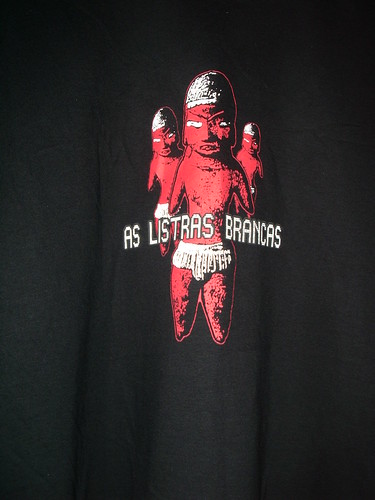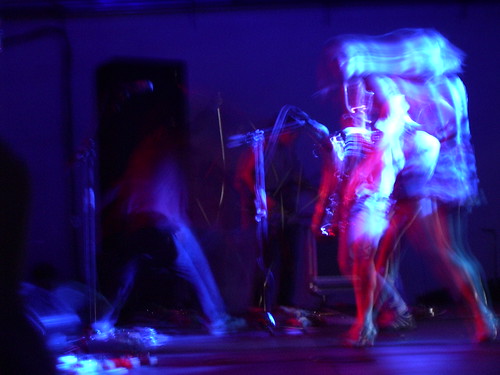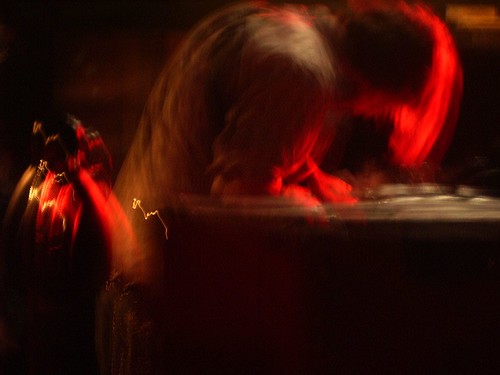


Sao Paolo
The Sao Paolo show, Saturday June 4th, the last date of the Brazilian tour, brings a deluge of guests, invited and uninvited. Of the former party, a young Peruvian girl and her family are the most honoured. The teenager’s name is Claudetta, and last year she emailed the Stripes’ organisation, begging them to play South America. Her plea was a very real influence on the band’s current touring plans, but logistics demanded the band miss Peru off their itinerary. Though poor, Claudetta’s family scraped together enough cash to take a short holiday in Sao Paolo, and the four of them are now seated side of stage, as the band stride out and greet the audience of the imaginatively-named Credit Card Hall.
You can tell the uninvited guests, the parasites. They’re the ones who still hover around the dressing room door while the band are playing, laying in wait for their prey. Like the guy with the video-camera, filming a documentary of his nomadic experiences for MTV, toting a vintage Lou Reed album he wants to give to Jack. Actually, make that ‘wants to be filmed giving the album to Jack, for his documentary’. Via John Baker, the film-maker’s self-serving offer is denied, but this doesn’t stop him offering one of the production crew cash to pose as Jack’s hand ‘receiving’ the album on-camera.
“Some kids chased us down the street a few blocks, in Panama I think,” muses Jack, in the bar of the Unique Hotel, Sao Paolo, where the White Stripes are staying the night of the show. “Once they caught us they said, ‘hey, we just wanted to say thank you, we saw you play the other night’. They gave to us, they didn’t take from us.”
The most intriguing of a very enigmatic clutch of songs on Get Behind Me Satan, ‘Take Take Take’ was inspired by an autograph by Rita Hayworth that he once saw, her lip-print on a handkerchief, next to which she’d written ‘My heart’s in my mouth’. “It blew my mind,” he remembers. “For her to have written something so metaphorical, as an autograph.”
‘Take Take Take’’s drama unfolds over dramatic dustbowl strum, the awestruck protagonist demanding first an autograph, then a photograph, and then finally a kiss from a passing Rita Hayworth.
“Give me a little credit,” White protests, pointedly. “I can think of something more interesting to write about than how terrible it is to be famous. It’s more about how kids today aren’t taught how to be humble, or when enough is enough. Like the other night, this kid asked us for an autograph; then, five minutes later, her friend asked for an autograph, and, five minutes later, she asked for a photograph, and then her friend asked for an autograph. We’re not at the zoo here, you know, we’re trying to eat dinner. But I’m not whining about celebrity; I’m whining about parents not teaching their kids manners.”
We meet many Jack Whites during our stay with the band: Jack the giddy newlywed, Jack the uncomfortable celebrity failing to elude the paparazzo’s flashbulb, Jack the young rocker stung by cynics who snickered at his collaboration with Loretta Lynn and his work for the Cold Mountain soundtrack, who felt he had to use his newfound fame to direct a new generation to the music he loved, but who now says “We’ve done too much paying respect to the past, we can’t move forward on our knees anymore.”
We meet the offended, old-fashioned boy griping about reality TV shows called Are You Hot?, “Where they bring out people onstage, and judge them. The presenter has a laser pointer,” he elaborates, shaking his head. “Parents tell their children not to make fun of other kids in the playground, and then they watch garbage like that. What are they teaching these kids? What kind of a role model is someone like Paris Hilton, dressed, basically, like a slut, and behaving stupid, because it worked for Ozzy Osbourne…
“I’m not some old fuddy duddy,” he adds. “America suffers, because they have this stupid, ridiculous, Conservative viewpoint on everything, they’re so mixed up about right and wrong. Seeing as they voted in that President, Americans obviously have no interest in the Truth. They only know what they’re told, and reality television’s telling them to judge everything around them. It’s really ugly. I think we should be ashamed of ourselves.
“You know you’ve matured when ask yourself, why do I bother?” he continues, darkly. “The politicians, they’re doing anything they want to do, taking whatever they can get, making themselves happy, and they don’t care who gets hurt. And when you reach that point and ask yourself, ‘why bother?’, that’s when you really turn into an adult. Because you make the decision, yes, it is worth bothering. If only for it’s own sake.”
There’s a common thread to all these Jack Whites, a stoic indignance, a forth-rightness, an old-fashioned sensibility that’s unafraid to express itself, to argue it’s case. A grounded common-sense that, you imagine, they share with John Gillis, so key is it to all their characters.
Like his alter ego, John Gillis has another obsession, one closely related to their shared passion for the truth. A hankering for a musical purity, a sonic fidelity with the ’truth’ of the music as was played. Asked about the proliferation of unusual instruments like the marimba on Get Behind Me Satan, he’s quick to point out that it doesn’t contradict the Stripes’ ongoing spartan aesthetic, “As we can only be playing two instruments between us at any one time.” And talking about modern music, his lip turns up in disgust, discussing lazy modern production methods, the reliance on cheap effects, the way clumsy application of something like artificial reverb can ruin his enjoyment of a whole song.
“If I can not even pay attention to such things, if I can listen to the song and not even think how it was done, then I love it a lot more,” he decides. “It becomes more beautiful at that point.
Like any illusion, once you know how the magician does it…
“…Then it’s ruined, yes,” he nods. “That’s exactly true.”
Jack White and John Gillis were both born in a poor, mainly-black area of Detroit. ‘Rock’n’roll’ meant nothing there, the kids were only into hip-hop, and sub-cultures like ‘punk’ or ‘goth’ only existed in the suburbs. Spending his spare hours obsessing over the Who, picking apart all their myths and trying to make sense of grand opuses like Tommy or Quadrophenia, he was entirely alone.
“It was the best feeling in the world,” he says, brightly, “To feel like you ‘owned’ a band. I guess, in America now, it’s not the ‘coolest’ thing in the world, to be a teenager who’s into The White Stripes. Most kids are probably into 50 Cent or Green Day.”
Perhaps, to those kids, the White Stripes mean as much as The Who meant to you, as a teenager.
“That would be amazing,” he stammers, again lost for words. “I wouldn’t be able to believe it… Women are always telling me, ‘My son loves your band, you’re his favourites’, and I usually think, that means he’s got a record of ours, maybe he likes us. I can’t imagine their son could love our band as much as I loved the Flat Duo Jets as a kid.”
But that’s exactly what’s happening, on a small but profound scale. Their record sales might not match the column inches they enjoy in the rock press, and the band’s red’n’white’n’black aesthetic might struggle against the Green Day tees and 50 Cent merchandise as the couture of choice among most American teenagers. But The White Stripes are a burgeoning cult in mainstream America, certainly in a commercially and culturally stronger position than contemporaries The Strokes. And like Jack with his Who obsession, those kids who manage to find the White Stripes, to make that connection, will have a much deeper connection with their music. Minority passions are like that and, besides, a group as rich with myth and innuendo are always going to win a more rabid fandom than anything the mainstream could easily clasp to its chest. You reckon that Jack White, the man who doesn’t like to play venues where he can’t feel the audience’s energy coming back to him, likes it that way. The White Stripes, thriving far outside their ‘little room’, but never losing touch with what fired their ambitions in the first place.
“It was just too big of a deal,” he reflects, on the media frenzy that greeted The White Stripes’ arrival in the UK as feted unknowns, only four years ago. “Our way to ‘handle’ it all was to dig deep, and push real hard against all the bullshit. We knew, once we broke through that barrier, we could always get back to where we used to be. And look where we are now, right back where we used to be. We were playing Panama the other day, to people who’d never heard of us, and we were playing music and winning people over.”
He smiles, newly married to one of the most beautiful women in the world, a man who has rediscovered his creative spark, who feels, in his own words, “reborn”. “You can’t beat that, that felt good to us - that’s a better success than selling millions, than getting the platinum records.”




No comments:
Post a Comment